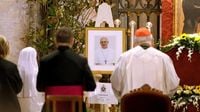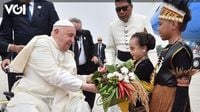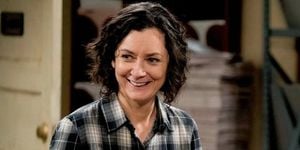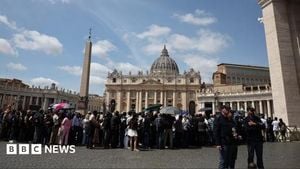The death of Pope Francis, the 266th Pope of the Catholic Church, has plunged the Vatican into mourning while simultaneously igniting a global race to select his successor. Cardinal Ignatius Suharyo, the Archbishop of Jakarta, emphasized that the upcoming conclave is characterized by discussions and pressures, but is free from corruption. As the world watches, 135 eligible cardinals will gather in Rome to vote for the next leader of the Catholic Church, marking a pivotal moment in its history.
Pope Francis, who passed away at the age of 88, had recently returned home after a serious respiratory infection that required hospitalization. His death was announced by Cardinal Kevin Farrell on Vatican television, stating, "With deep sorrow, I must announce the death of our Holy Father Francis." The conclave, set to convene on the 15th day following his death, will see cardinals from around the world come together to discuss and ultimately select the next pope.
Among the 138 cardinals eligible to vote, a diverse group is being considered as potential successors. Italy is expected to play a significant role in the electoral assembly, with several prominent candidates emerging. Pietro Parolin, the 70-year-old Vatican Secretary of State, has been a close aide to Pope Francis and is well-respected on the international stage. His experience in diplomacy and significant contributions to the Vatican's engagement with global leaders position him as a strong contender.
Another noteworthy candidate is Matteo Maria Zuppi, the 69-year-old Archbishop of Bologna. Known for his advocacy for migrants and the marginalized, Zuppi has a long history of diplomatic involvement, including acting as a special envoy for peace in Ukraine. His compassion and commitment to social justice resonate with the core values of Pope Francis's papacy.
In addition, Jean-Marc Aveline, the 66-year-old Archbishop of Marseille, is recognized for his calls for interfaith dialogue and cultural understanding. Aveline, who became a cardinal in 2022, has been a close ally of Pope Francis and embodies the principles of inclusivity and outreach that have defined the current papacy.
From Sweden, the 75-year-old Anders Arborelius stands out as the first Catholic bishop in a predominantly Protestant nation. His conservative stance on certain issues, such as same-sex marriage, contrasts with the progressive values of Pope Francis, yet Arborelius advocates for the welcoming of migrants, aligning with the pope's vision of a more inclusive church.
As discussions unfold, Cardinal Suharyo expressed hope that the elected pope will possess a clear vision for the future of the Catholic Church, emphasizing that the process will be guided by the Holy Spirit. "There should be no interference from the authorities, and there should be no bribes for the election," he stated, reinforcing the sanctity of the conclave.
Across the globe, other cardinals are also being considered. For instance, Louis Antonio Tagle, the 67-year-old Archbishop of Manila, is viewed as a frontrunner from Asia. Tagle is known for his charisma and willingness to address the Church's shortcomings, including sexual abuse scandals. His advocacy for the poor and marginalized mirrors the values championed by Pope Francis.
In Africa, Cardinal Peter Turkson from Ghana, aged 76, is often mentioned as a potential candidate. Turkson has been a prominent figure in the Church and has previously expressed reluctance about becoming pope, stating that a black pope would face significant challenges. He is well-regarded for his academic contributions and advocacy for social justice.
Meanwhile, in the United States, Cardinal Timothy Dolan, the 75-year-old Archbishop of New York, represents a more conservative viewpoint within the Church. Dolan has been vocal about his opposition to abortion and has sought to engage with the growing Latino Catholic population in his archdiocese.
As the conclave approaches, the world is left to speculate on who will emerge as the next leader of the Catholic Church. With a diverse array of candidates, each bringing their unique perspectives and experiences, the decision will undoubtedly shape the future direction of the Church.
While the conclave is steeped in tradition, it is also a reflection of the changing dynamics within the Church and the broader world. The next pope will not only inherit the legacy of Pope Francis but will also face pressing challenges, including addressing sexual abuse scandals, engaging with modern societal issues, and fostering interfaith dialogue.
As the cardinals prepare for their gathering, the eyes of millions will be on Rome, waiting to see who will take up the mantle of leadership in this pivotal moment for the Catholic Church. The discussions and deliberations that will take place behind closed doors are not just about selecting a new pope; they are about envisioning the future of a faith that has shaped the lives of billions across the globe.





